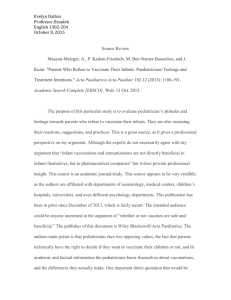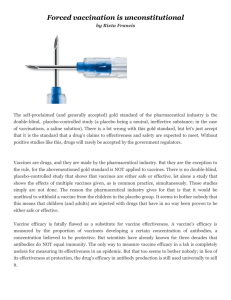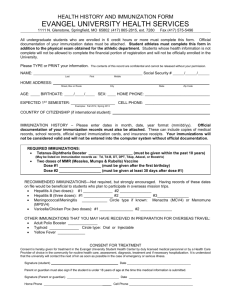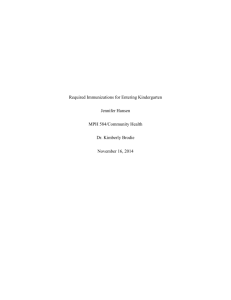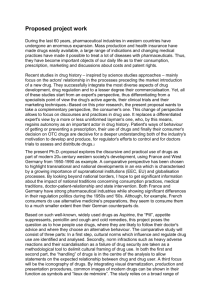Evelyn Dalton Professor Dziadek Composition 1302
advertisement
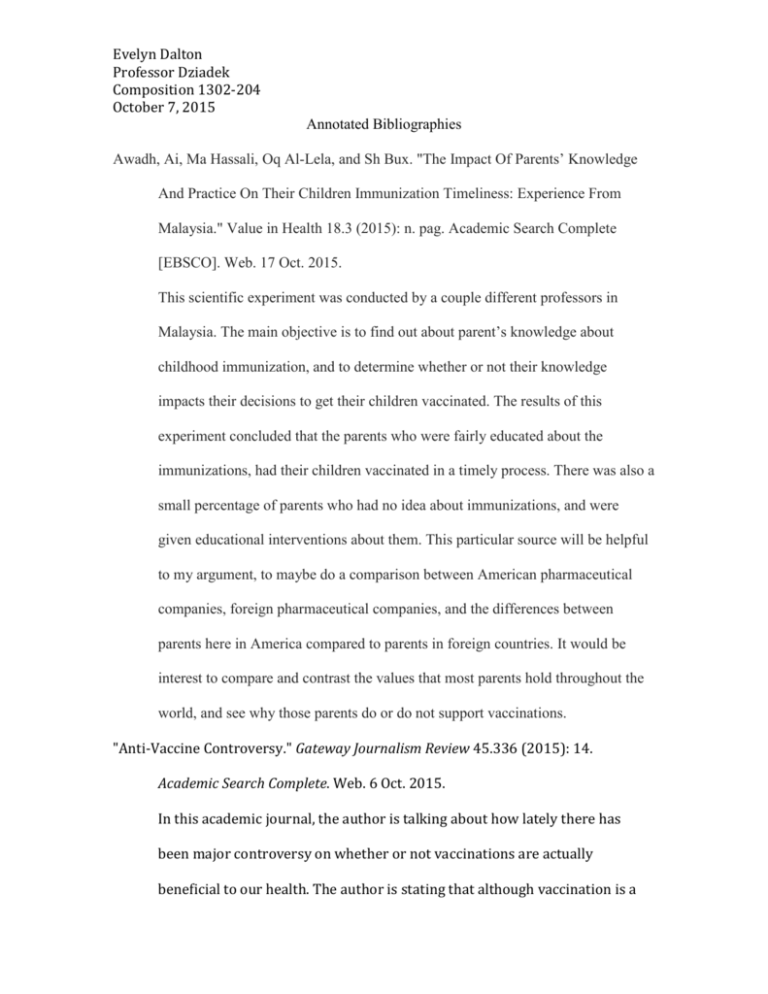
Evelyn Dalton Professor Dziadek Composition 1302-204 October 7, 2015 Annotated Bibliographies Awadh, Ai, Ma Hassali, Oq Al-Lela, and Sh Bux. "The Impact Of Parents’ Knowledge And Practice On Their Children Immunization Timeliness: Experience From Malaysia." Value in Health 18.3 (2015): n. pag. Academic Search Complete [EBSCO]. Web. 17 Oct. 2015. This scientific experiment was conducted by a couple different professors in Malaysia. The main objective is to find out about parent’s knowledge about childhood immunization, and to determine whether or not their knowledge impacts their decisions to get their children vaccinated. The results of this experiment concluded that the parents who were fairly educated about the immunizations, had their children vaccinated in a timely process. There was also a small percentage of parents who had no idea about immunizations, and were given educational interventions about them. This particular source will be helpful to my argument, to maybe do a comparison between American pharmaceutical companies, foreign pharmaceutical companies, and the differences between parents here in America compared to parents in foreign countries. It would be interest to compare and contrast the values that most parents hold throughout the world, and see why those parents do or do not support vaccinations. "Anti-Vaccine Controversy." Gateway Journalism Review 45.336 (2015): 14. Academic Search Complete. Web. 6 Oct. 2015. In this academic journal, the author is talking about how lately there has been major controversy on whether or not vaccinations are actually beneficial to our health. The author is stating that although vaccination is a Evelyn Dalton Professor Dziadek Composition 1302-204 October 7, 2015 type of advanced treatment that there does not seem to be a proper way to actually do it. The author also states that the benefits highly outweigh the risks. The author ends the abstract by stating that controversies of vaccination can alter the positive acceptance of immunization and pose a threat to our societies health. Castillo, Antonio Fernandez, and Maria Vilchez Lara. "Anxiety and Parent's Beliefs about Medication in Primary Pediatric Health Care." Clinica Y Salud 25.2 (2014): 117-22. Academic Search Complete [EBSCO]. Web. 18 Oct. 2015. This was written by Antonio Fernandez-Castillo, and Maria Vilchez-Lara. Both authors affiliated with universities, and university hospital complexes in Spain. The purpose of this study was to evaluate the relation between parent’s anxiety and what medical decisions they make for their children. Results show that negative beliefs about medicine were associated with parents who dealt with high anxiety, especially for pediatric care. This is an interesting source for my article, as it relates that parents also make their decisions based off their own psychological issues/beliefs. This can be another source of information as why parents may choose to back out of getting their children vaccinated. Cohen, Elizabeth. "Should I Vaccinate My Baby?" CNN. Cable News Network, 19 June 2008. Web. 08 Oct. 2015. CNN is a widely known news source. This article was written by Elizabeth Cohen who is a CNN medical correspondent. This article provides a position against vaccinations for infants, which will provide information for my argument Evelyn Dalton Professor Dziadek Composition 1302-204 October 7, 2015 that scheduled infant vaccinations are not effective, and may be beneficial to others besides infants themselves. This particular article discusses how a mother of two, who was once for vaccinations, had changed feelings after her second child was born. In the article, the mother states, “I wasn’t a hundred percent convinced there was a link between autism and vaccines.” Her child’s autism was found to be “significantly aggravated” by her childhood vaccines. According to pediatricians, there has been a dramatic increase in the number of parents who opt to make changes in the vaccine calendars they receive. This article also offers a couple different alternatives from the recommended set schedule for infant vaccinations. Goldstein, Myrna Chandler, and Mark A. Goldstein. Controversies in the Practice of Medicine. Westport, CT: Greenwood, 2001. Print. This book is about the controversies in the practice of medicine. The authors of this book are actual medical doctors. Since the authors are doctors, they would be held as highly credible on my topic. There are many chapters over different medical practices, but one particular chapter (chapter 12) is about “Childhood Vaccinations”. The purpose of vaccines are thoroughly explained, as well as the projected benefits of them. However, the authors also offer the perspective that vaccines are not always perspective, and their outcomes can be worse than what the vaccine is trying to protect against. I found this book at the Bell library TAMUCC. Evelyn Dalton Professor Dziadek Composition 1302-204 October 7, 2015 "Infant Immunizations FAQs." Centers for Disease Control and Prevention. Centers for Disease Control and Prevention, 24 Feb. 2012. Web. 08 Oct. 2015. This article was published by the Center for Disease Control and Prevention Centers. This article provides a series of different questions and answers pertaining to infant vaccinations. The questions range from “Are vaccines safe”, “What are the side effects of vaccines?”, and “Can vaccines overload my baby’s immune system?”. These different questions and answers can help provide a counter argument to my argument, and give some helpful information. Also, it might be good to point out that this is also a government website, so these answers could be biased. This information could definitely be useful to my paper by providing these different insights. Lesher, Richard L. "Unnecessary Federal Vaccine Program Wastes Nearly $1 Billion Annually." 51.30 (1995): 1 page. Ebscohost. Web. This academic journal was written by Dr. Lesher, who is the president of the U.S Chamber of Commerce. This article is talking about how the “Vaccines for Children” program was established in the 1990’s. The rates of infants getting vaccinations during this time period was extremely low, and the blame was set to be put on greedy pharmaceutical companies that hike up the prices to make a good profit. Thus, the VFC program was created in order to provide those low income families with vaccinations for their infants. Most families that received these vaccinations were actually middle class families. Lesher describes that the reason for such low immunization rates may not be because of the price of vaccinations, but perhaps that families choose not to vaccinate for certain reasons, Evelyn Dalton Professor Dziadek Composition 1302-204 October 7, 2015 or the family is just not educated nor has the resources to allocate those vaccinations. This article is a good source for my argument as it gives a prospective of why the immunization rate amongst infants is low, corresponding with my argument. Perry, Joshua E., Dena Cox, and Anthony D. Cox. "Trust and Transparency: Patient Perceptions of Physicians' Financial Relationships with Pharmaceutical Companies." The Journal of Law, Medicine & Ethics 42.4 (2014): 475-91. Academic Search Complete [EBSCO]. Web. 17 Oct. 2015. This academic journal was written by a couple of authors, Joshua Perry, Dena Cox, and Anthony Cox. This academic journal discusses the financial ties between physicians and pharmaceutical companies. The main point of this journal is to discuss the viewpoints patients have of the ties between physicians and pharmaceutical companies. An experiment was conducted using a sample of adults from the U.S, and surveying them and their opinions based on a given scenario. These responses were then analyzed, and found that respondents were actually very critical of doctors who owned a share of drug company stock, or received various industry payments. This academic journal would be a really great source of information to back up my argument. As I assume that most of these adults are parents, this may further evaluate why parents may opt out of getting their kids/infants vaccinated. Santoro, Michael A., and Thomas M. Gorrie. Ethics and the Pharmaceutical Industry. Cambridge: Cambridge UP, 2005. Print. Evelyn Dalton Professor Dziadek Composition 1302-204 October 7, 2015 This book was written by Michael Santoro and Thomas Gorrie. Michael A.Santoro is an Associate Professor with tenure at Rutgers Business School, where he teaches courses on business ethics, global social issues, and ethical issues in the pharmaceutical industry. Thomas M. Gorrie, Ph.D is Corporate Vice President, Government Affairs & Policy, Johnson &Johnson, with responsibility as Corporate Officer for all federal, state, and government affairs and policy. These authors discuss many different aspects to pharmaceutical companies, such as ethical challenges of pediatric research and vaccine “promises.” This book also has many diverse perspectives and experiences pertaining to the pharmaceutical industries. This book is a great source for my paper, as there are so many different viewpoints on the pharmaceutical companies, which is vital to backup argument, and to also provide a counter argument. Stockwell, Melissa, Matilde Irigoyen, Raquel Andres Martinez, and Findley, Sally. "How Parents' Negative Experiences at Immunization Visits Affect Child Immunization Status in a Community in New York City." Public Health Reports 126 (2011): 2432. Academic Search Complete [EBSCO]. Web. 19 Oct. 2015. This academic journal was written by Melissa Stockwell, Matilde Irigoyen, Raquel Andres-Martinez, and Sally Findley. These authors have affiliations to Columbia University, New York Presbyterian Hospital, and the Albert Einstein Medical Center, all located in New York. This article talks about how families experiences will getting their immunizations may affect their children’s immunization status. The authors assessed the association between families’ negative immunization experiences and under-immunization. Parents of children Evelyn Dalton Professor Dziadek Composition 1302-204 October 7, 2015 ages ranging from 2 months to 36 months were surveyed about their personal immunization experiences at community health centers, hospital based clinics, private practices, and community based organizations located in New York. Results state that parent’s negative beliefs about their children’s immunization experiences are associated with the absence of four major components; continuity care, family-centered care, compassionate care, and comprehensive care. Additionally, children in families who reported negative experiences showed to be under-immunized. This source provides great information for my argument, as it provides more viewpoints that parents have about immunizations, but also viewpoints professionals have about these parent’s viewpoints.
